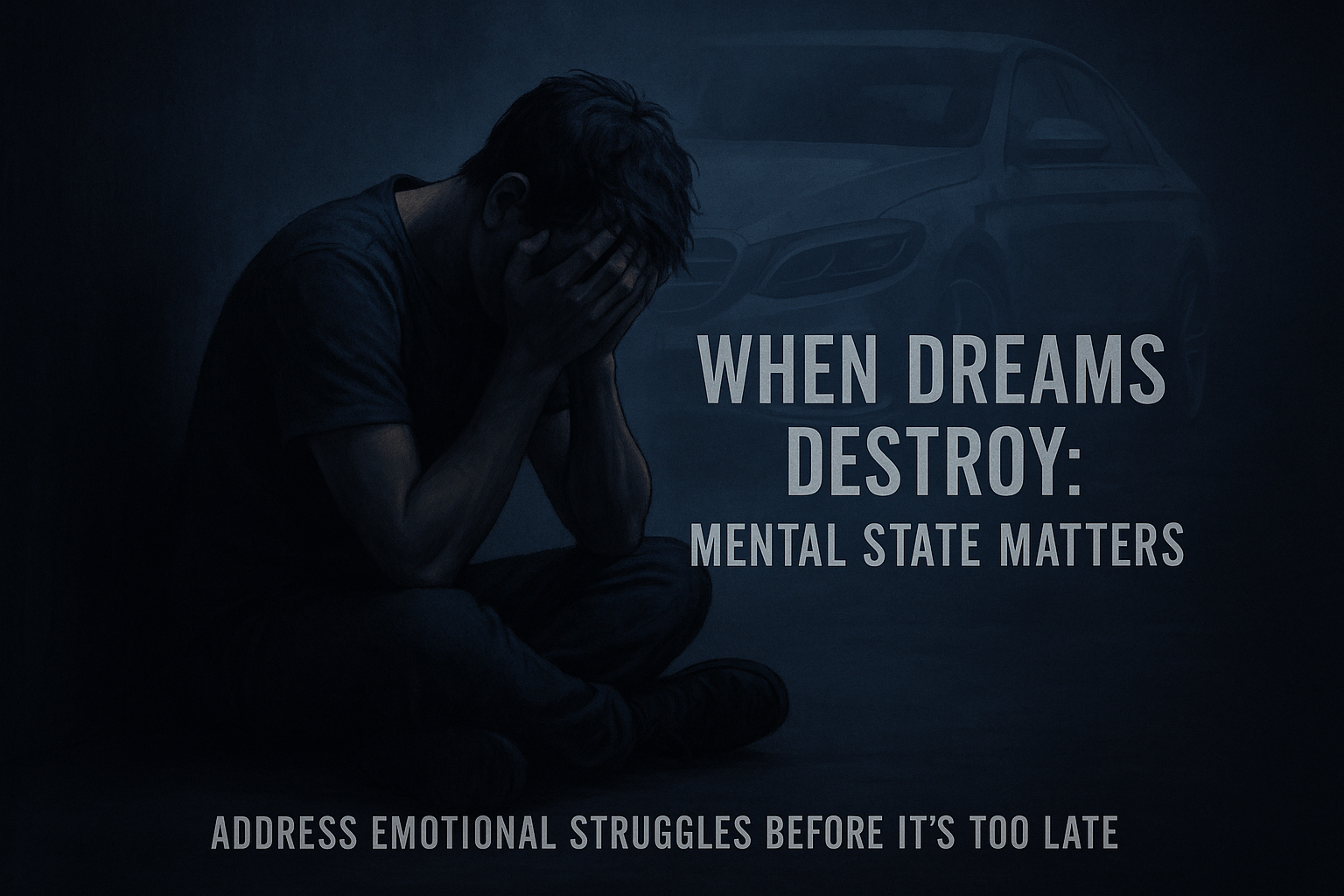
7 Powerful Tragic Insights into the Mental State Behind the Telangana Suicide Tragedy
Recently, a heartbreaking story emerged from Telangana, India. A 21-year-old man allegedly died by suicide after his father, a farm labourer, couldn’t afford to buy him a luxury car. Despite the parents’ attempt to buy a Maruti Swift Dzire instead, the young man—reportedly addicted to alcohol and in constant conflict with his parents—ended his life. While the incident has shocked many, it compels us to reflect on deeper issues: what leads a person to such extreme steps? What mental state contributes to such emotional instability?
The Unseen Battle: Understanding Mental State Before Suicide
Suicide is never caused by a single factor. It is the result of a buildup of unresolved emotions, distorted thinking patterns, unmet needs, and lack of healthy coping mechanisms. In this case, the mental state of the young man was possibly impacted by multiple factors—poor emotional regulation, substance abuse, entitlement, and psychological instability.
Modern society often links personal worth to material success. For some youth, luxury becomes a benchmark of self-esteem. When that illusion collapses, the mental state can become fragile, leading to emotional breakdown.
The Role of Parenting and Communication
Children form their understanding of self and the world largely through parenting. In families where communication is either overly permissive or authoritarian, emotional maturity can suffer. If the young man in this incident had grown up associating love with material fulfillment, it’s possible that denial of a car felt like rejection.
Effective parenting isn’t about fulfilling every demand—it’s about helping children manage disappointment and develop a realistic view of life. Poor emotional conditioning can result in impulsive behaviors, emotional blackmail, or depression when expectations aren’t met.
Substance Abuse and Emotional Impairment
The police report mentioned the youth was addicted to alcohol. Substance abuse impairs cognitive and emotional control. Under its influence, problems appear bigger, consequences smaller, and thoughts of suicide more inviting. It distorts the mental state by exaggerating distress and lowering the brain’s ability to regulate it.
Addiction often coexists with underlying mental health issues like depression, anxiety, or low frustration tolerance. This makes it harder to respond to stress in healthy ways. When coupled with ongoing family arguments, it becomes a ticking time bomb.
Unrealistic Expectations and Peer Pressure
Another aspect influencing youth today is the glorification of wealth and luxury. Social media constantly bombards young minds with images of expensive cars, luxury vacations, and perfect lifestyles. This sets an unrealistic bar for happiness and success.
For a person whose emotional base is weak, not achieving these standards can deeply damage self-worth. The mental state becomes preoccupied with comparison, inadequacy, and perceived failure—even when basic needs are met.
Lack of Emotional Education and Mental Health Support
India still lacks widespread awareness around emotional intelligence and mental health. Schools teach subjects, not life skills. Emotional literacy—how to name, manage, and express emotions—is barely addressed. As a result, many young people reach adulthood without tools to navigate setbacks.
This young man might never have learned how to deal with disappointment or conflict. His parents possibly didn’t know how to support him emotionally either. Without early intervention, a disturbed mental state can spiral into self-destructive behavior.
How Society Can Help Prevent Such Tragedies
- Mental Health Education in Schools
Introducing emotional education at a school level can create emotionally resilient children. Lessons on self-worth, stress management, and disappointment can go a long way in nurturing balanced minds. - De-glorifying Materialism
Influencers, media platforms, and educators must shift the narrative from external success to inner well-being. Life is not about what you own, but how you live and connect with others. - Parental Guidance Programs
Parents, especially in rural and low-income families, need support in learning how to deal with their children’s emotional needs. Love does not always mean agreement or gifts—it means presence, understanding, and healthy boundaries. - Accessible Counseling Services
Community mental health centers and helplines should be promoted. Regular counseling should be normalized for young people, especially those showing signs of behavioral issues, substance use, or emotional volatility. - De-addiction and Rehabilitation Support
Alcoholism must be treated not just as a habit but as a mental health issue. Families and individuals must have access to rehabilitation and therapy, especially when substance abuse and depression intersect.
Conclusion: The Invisible Crisis of the Mental State
The Telangana suicide case is not just a story of a denied luxury car. It’s a reflection of emotional gaps, unmet psychological needs, and an overlooked mental health crisis. When a person feels unheard, unsupported, and unable to cope with reality, their mental state can become dangerously unbalanced.
What this tragedy teaches us is that behind every extreme act lies an invisible crisis. It’s not about the car—it’s about identity, emotional resilience, and the need for understanding. If we want to prevent such losses in the future, we must stop focusing on the surface and start healing the mind.

